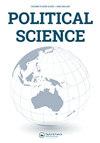感受就是相信:中国、美国和菲律宾总统罗德里戈·杜特尔特的情感信仰
IF 1.2
4区 社会学
Q3 POLITICAL SCIENCE
引用次数: 1
摘要
摘要全球物质权力和规范权力分配的持续变化,特别是美国和中国之间的变化,对国际体系中较小、较弱的行为者的外交政策战略产生了重大影响。由于他们以能够保证生存的方式主宰国际政治的能力有限,IR中的许多人认为,他们通常更喜欢在当前的现状下运作,而不是试图改变现状。然而,在罗德里戈·杜特尔特总统的领导下,似乎通过戏剧性地转向北京和远离华盛顿来反驳这一观点,至少在修辞上是这样。本文超越了影响国家外交政策的常见系统性因素和国内干预变量,研究了有助于塑造这些工具的被忽视的情绪和情感信念。我对这些看不见的、尽管存在的机制的调查揭示了杜特尔特情绪化和强化的信念的核心,即为他以中国为中心(而不是以美国为中心)的外交政策立场提供更完整和现实的解释。正如我在整篇论文中所论证和证明的那样,因为情绪和情感信念是人类行为的强大引擎,它们对任何国家领导人的外交政策动机、决策和行动都有巨大影响。本文章由计算机程序翻译,如有差异,请以英文原文为准。
To feel is to believe: China, United States, and the emotional beliefs of Philippines’ Rodrigo Duterte
ABSTRACT The ongoing shifts in the global distribution of material and normative powers, particularly between the United States and China, have significant repercussions on the foreign policy strategies of smaller, weaker actors in the international system. Due to their limited capacity for dictating international politics in ways that could guarantee their survival, many in IR have argued that they usually prefer to operate within the prevailing status quo rather than attempting to revise it. Nevertheless, the Philippines, under the leadership of President Rodrigo Duterte, seems to disprove this observation by dramatically pivoting towards Beijing and away from Washington, at least rhetorically. This paper moves beyond the commonly cited systemic factors and domestic intervening variables affecting the states’ foreign policies by examining the neglected emotions and emotional beliefs that help shape these instruments. My investigation of these unseen, albeit existing mechanisms, reveals the centrality of Duterte’s emotionally constituted and strengthened beliefs in providing a more complete and realistic explanation to his China-centric (as opposed to US-centric) foreign policy stance. As I argue and demonstrate throughout the paper, because emotions and emotional beliefs are powerful engines of human behaviour, they exert enormous influence on any state leader’s foreign policy motivations, decisions, and actions.
求助全文
通过发布文献求助,成功后即可免费获取论文全文。
去求助
来源期刊

Political Science
POLITICAL SCIENCE-
CiteScore
0.90
自引率
0.00%
发文量
13
期刊介绍:
Political Science publishes high quality original scholarly works in the broad field of political science. Submission of articles with a regional focus on New Zealand and the Asia-Pacific is particularly encouraged, but content is not limited to this focus. Contributions are invited from across the political science discipline, including from the fields of international relations, comparative politics, political theory and public administration. Proposals for collections of articles on a common theme or debate to be published as special issues are welcome, as well as individual submissions.
 求助内容:
求助内容: 应助结果提醒方式:
应助结果提醒方式:


